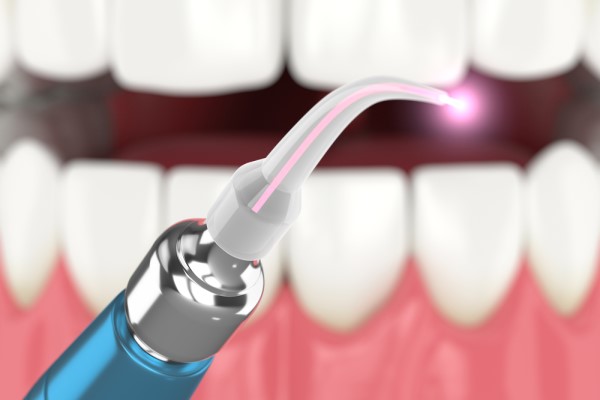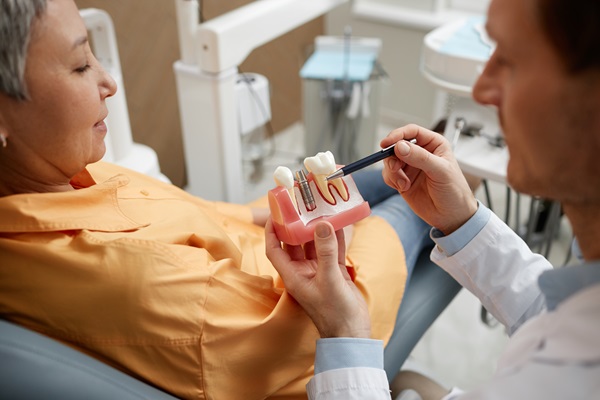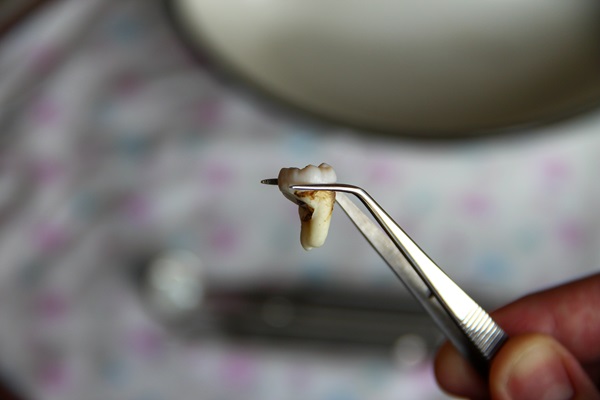How LAPIP Is Used for Dental Implants

Laser Assisted Peri-Implantitis Protocol, or “LAPIP™,” is a minimally invasive procedure to treat gum disease around dental implants. Laser gum surgery hurts less than other treatment options. Since no incision is required, the recovery period for LAPIP is much shorter than that of traditional gum surgery.
Difference between LAPIP and LANAP®
There are two types of laser gum surgery: LAPIP and Laser Assisted New Attachment Procedure, or “LANAP.” The U.S. Food and Drug Administration has cleared both to treat gum disease, and both use the PerioLase® MVP-7 dental laser to remove damaged gum tissue safely and effectively. The difference is the reason for the procedure.
LAPIP is reserved for cases where peri-implant disease (a type of gum disease) leads to dental implant failure. Periodontists use dental lasers to remove infected gum tissue and then regenerate healthy tissue around a dental implant. It is also possible to rebuild bone lost to peri-implant disease.
Failing dental implants and peri-implant disease
Also known as peri-implantitis, peri-implant disease is the medical term for gum disease in the tissue surrounding dental implants. Similar to gum disease around natural teeth, peri-implant disease can be painful and lead to inflammation of the gums, tissue damage, bone loss, and dental implant failure.
LAPIP treatment procedure
First, the periodontist will use dental lasers to target and remove infected gum tissue, plaque buildup, and corrosion contaminants from the failing dental implant. Next, the periodontist will remove any buildup on the implant's surface with an ultrasonic scaler. Then, the periodontist will create a blood clot with the laser, sealing the gum tissue and stimulating healthy tissue and bone growth.
How long does LAPIP take?
LAPIP typically takes a couple of appointments to complete, with each appointment averaging between two to three hours. However, this can vary depending on the severity of the patient's peri-implant disease and the number of implants affected. In some cases, LAPIP may only take one appointment.
What to expect after LAPIP
The periodontist will provide patients with personalized post-care instructions. Like after any dental surgery, keep the mouth as clean as possible. Do not, however, brush the surgical site until advised (about 10 days). Gently rinsing the mouth is recommended and can help remove any food stuck around the treated area. Patients can expect to remain on a liquid diet for a few days after surgery.
When gums change color after LAPIP
It is normal for gums to change in color after laser gum surgery. Often, the gums will turn white, yellow, gray, red, or blue and purple. Gum tissue may also appear stringy. The gums will go back to normal shortly.
What to do when gums bleed following LAPIP
The gums will likely bleed around the surgical site. To stop the blood flow, find the source and put pressure on it. Note that the bleeding will likely seem worse than it is at first because it is in the mouth. If the blood gets in the way of locating the source, gently rinse with cold water to clear up the mouth.
Managing postoperative pain and discomfort
Pain after any oral surgery is inevitable. There are ways to make the pain more bearable, however. Over-the-counter painkillers (e.g., acetaminophen or ibuprofen) can help while the surgical site heals. In addition, periodontists may prescribe pain medication after LAPIP in case the patient experiences excessive pain once discharged. Resting with the head elevated can help ease pain and reduce the chances of bleeding.
How the patient eats and drinks after LAPIP will also impact pain level. Do not use a straw or chew on the side of the mouth that was operated on. Some patients may need to eat soft foods for longer than recommended. Different patients heal at different rates; do not rush the recovery process. Slowly returning to a normal diet will help reduce pain and promote healing.
Benefits of laser gum surgery
Compared to traditional gum surgery, laser gum surgery has many advantages. Patients choose LAPIP over traditional gum surgery because it does not require tissue to be cut away or the implants to be removed. Since the structural tissue is maintained, LAPIP allows patients to opt for different treatments if needed later on.
LAPIP offers additional benefits:
- Highly effective in treating gum disease
- Minimally invasive, quick procedure
- Lower chance of postoperative infections
- Helps restore failing dental implants
- Less painful than gum flap surgery
- Short recovery period
LAPIP for failing dental implants
Dental implants appeal to many patients because of their permanence. When implants fail due to gum disease, it can be painful and frustrating. Save implants and restore dental health with LAPIP.
Request an appointment here: https://corderoperiodontics.com or call Rafael E. Cordero, DDS PA at (561) 763-9221 for an appointment in our Palm Beach Gardens office.
Check out what others are saying about our services on Yelp: Read our Yelp reviews.
Recent Posts
Dental implants are permanent options for replacing missing teeth and repairing one's smile. Instead of contending with the annoying glue of dentures and the risk of them slipping out while talking, patients can enjoy dental devices that function like natural teeth by opting for dental implants. To determine if these are the right choices for…
A tooth extraction is a common dental procedure that involves removing a tooth from its socket in the jawbone. According to the American Dental Association, millions of tooth extractions are performed annually. This treatment is recommended when a tooth cannot be saved or if its presence threatens the patient's oral health. Tooth removal might seem…
One of the most popular restorations for missing teeth is dental implants. However, that does not mean that they are appropriate for every patient. Under certain circumstances, implants may be contraindicated. If you are interested in this treatment, you should discuss with your dentist whether you are a candidate.The implant procedure involves multiple steps.A rod…
If you are missing one or more permanent teeth, dental implants may be an option for replacing them. Placing the implants requires an operation, and not everyone is a candidate for the surgery. Your dentist can discuss the criteria you must meet to be eligible. If you do not meet the criteria now, it may…


